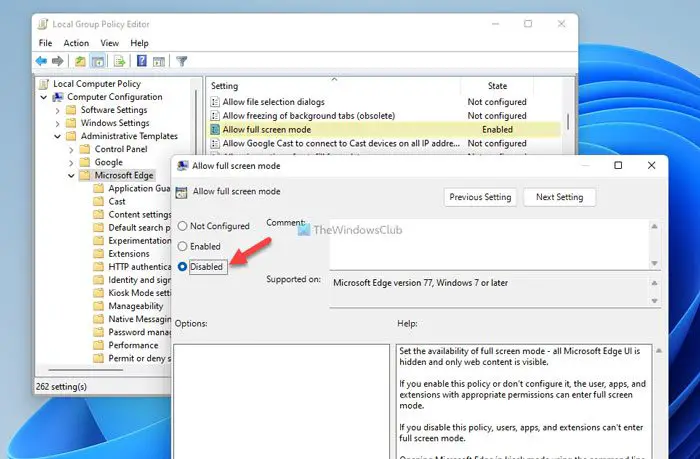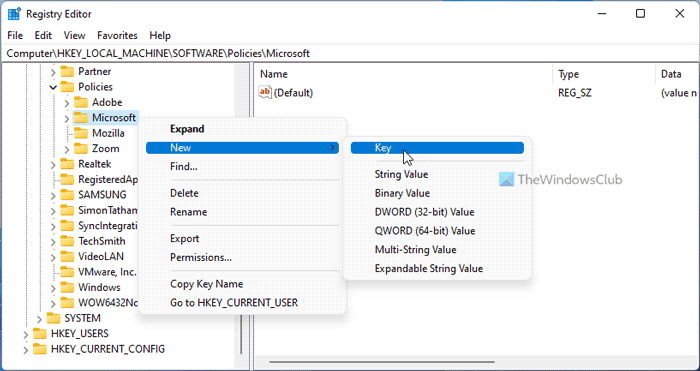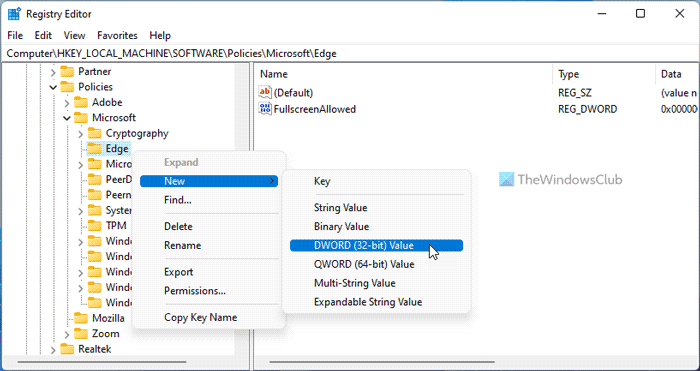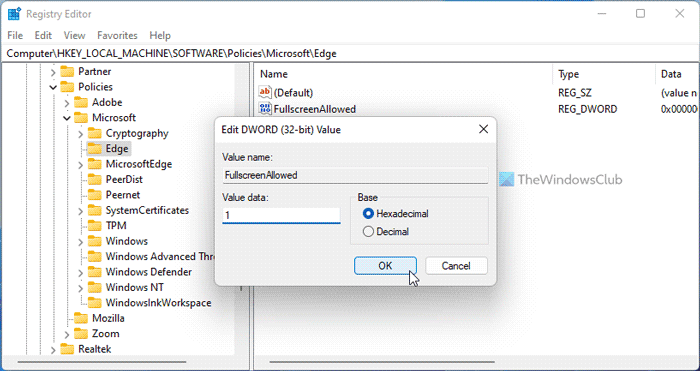If you do not want users to use the full-screen mode in the Microsoft Edge browser, then this guide will help you. You can allow or block users from using full-screen mode in Microsoft Edge using the Group Policy or Registry Editor. You can prevent Microsoft Edge from opening the window in full-screen mode using this tutorial.
Allow or block users from using Full screen mode in Edge
To allow or block users from using full-screen mode in Microsoft Edge browser, follow these steps:
- Press Win+R to open the Run prompt.
- Type gpedit.msc and click the OK button.
- Go to Microsoft Edge in Computer Configuration.
- Double-click on the Allow full screen mode setting.
- Choose the Enabled option to allow.
- Choose the Disabled option to block.
- Click the OK button.
Let’s check out these above-mentioned steps in detail.
First, open the Local Group Policy Editor. Although there are many methods, you can use the Run prompt to get it done. For that, press Win+R to open the Run prompt, type gpedit.msc, and click the OK button.
Then, go to the following path:
Computer Configuration > Administrative Templates > Microsoft Edge
However, if you want to apply this change in the current user account only, you need to navigate to the same path but in the User Configuration folder.
Here you can find a setting named Allow full screen mode. Double-click on this setting and choose the Enabled option to allow and the Disabled option to block.

Finally, click the OK button to save the change.
How to allow or block users from using Full screen mode in Edge using Registry
To allow or block users from using full-screen mode in Edge using Registry, follow these steps:
- Search for regedit in the Taskbar search box.
- Click on the search result and click the Yes
- Navigate to Microsoft in HKLM.
- Right-click on Microsoft > New > Key and name it Edge.
- Right-click on Edge > New > DWORD (32-bit) Value.
- Name it as FullscreenAllowed.
- Set the Value data as 1 to allow and 0 to block.
- Click the OK button.
- Restart your computer.
To know more about these steps, keep reading.
To get started, open the Registry Editor. To do that, search for regedit in the Taskbar search box, click on the search result and click the Yes button in the UAC prompt.
Then, go to this path:
HKEY_LOCAL_MACHINE\SOFTWARE\Policies\Microsoft
However, if you want to apply this change in the current user account, you need to navigate to this path:
HKEY_CURRENT_USER\SOFTWARE\Policies\Microsoft
Right-click on Microsoft > New > Key and name it Edge.

Then, right-click on the Edge > New > DWORD (32-bit) Value and name it as FullscreenAllowed.

If you want to allow full screen, you need to double-click on it and set the Value data as 1. However, if you want to block Edge from opening the full screen, keep the Value data as 0.

Click the OK button, close all opened windows, and restart your computer.
Read: How to play Video in Full-screen Mode in Edge browser
How do I enable full screen in Microsoft Edge?
Opening the Microsoft Edge browser in full-screen mode is not a big deal at all. To open full screen in Microsoft Edge in Windows 11/10, you can press the F11 button on your keyboard. Whether it is Google Chrome, Firefox, or Microsoft Edge, you can use the same hotkey to activate the full-screen mode.
How do I fix Edge not opening in Full Screen mode?
If Edge is not opening in Full-Screen mode, check the Registry of Group Policy settings as mentioned above. Alternatively, create a desktop shortcut using msedge.exe –start-fullscreen as the target, or ensure that the Run Maximized option is selected in the Microsoft Edge Properties box under the Shortcut tab.
How do I change display settings in Edge?
To change the display settings in Edge browser, you need to open the Properties first. For that, right-click on the Edge browser icon and select Properties. Then, go to the Compatibility tab and check the Run this program in compatibility mode for the checkbox. Following that, you can tweak various display settings under the Settings menu.
That’s all! I hope it helped.
Read: How to make all windows open maximized or full-screen always in Windows.
Leave a Reply